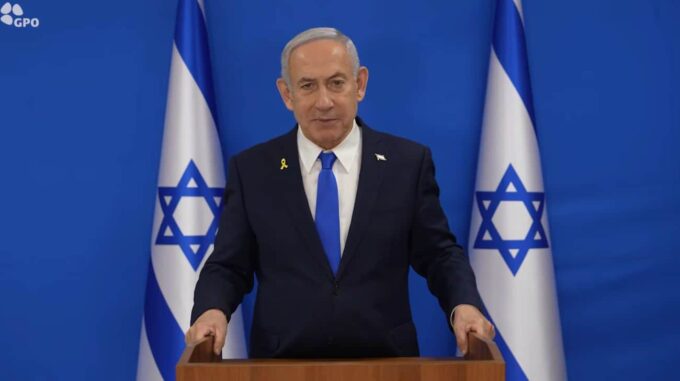Nuclear Terrorism Threat: Netanyahu Announces Iran’s Intent to Transfer Weapons to Proxy Groups

Israeli Prime Minister Benjamin Netanyahu made a high-profile statement regarding Iran’s nuclear program, emphasizing the seriousness of the threat it poses to the region and the world. According to the Israeli leader, the Iranian regime is not only seeking to develop its own nuclear weapons but also intends to transfer them to terrorist groups supported by Tehran. This revelation marked a significant step in the escalating tensions between Israel, Iran, and the international community, which has long expressed concerns over Iran’s aggressive policies. As reported, in his address released on June 14, Netanyahu emphasized that Israeli intelligence agencies have obtained concrete data indicating Iran’s plans — namely, the transfer of nuclear weapons to terrorist organizations operating both regionally and beyond. “We have received information that the reckless regime in Tehran is preparing to transfer nuclear weapons to its terrorist proxies. This is nuclear terrorism in its worst forms. Such activities threaten not only the region but the entire world,” he said. Netanyahu added that Israeli military and intelligence forces have already established “routes to Tehran,” and that its air force is prepared to carry out sudden strikes against Iranian facilities involved in the nuclear program. According to him, Israeli fighters are in high readiness, and operations could be launched at any moment to prevent Iran’s nuclear gains, which he estimates have already crossed a critical threshold. “I can say this: there are signs that senior officials in Tehran are already packing their suitcases. They feel that something is approaching and are eager to quickly shut down their operations,” the Israeli Prime Minister stated. This hints at the possibility that Iranian authorities are sensing increased pressure and the potential for a large-scale military operation from Israel. Netanyahu underscored that all these measures are supported by the United States, with whom Israel maintains close cooperation in security and defense matters. He stressed that the U.S. remains a key ally in this issue and supports Israel’s efforts to prevent the proliferation of nuclear weapons to states such as Iran. Background to the conflict: Tensions between Israel and Iran have significantly escalated in recent months. On the night of June 13, Israeli forces carried out strikes on sites within Iranian territory directly linked to Iran’s nuclear program. These actions were aimed at thwarting Iran’s efforts to develop nuclear weapons and to prevent potential security threats in the region. In response, Iran launched ballistic missiles at Israeli positions, increasing the regional tension. The international community responded in various ways. European nations called for dialogue and diplomatic resolution, condemning the escalation of violence. France, Germany, and the United Kingdom urged both sides to return to negotiations. While the Israeli Prime Minister reiterated Israel’s intention to destroy Iran’s nuclear infrastructure by force, U.S. President Donald Trump called on Iran’s leadership to negotiate a new nuclear agreement that would impose restrictions on Iran’s nuclear activities, emphasizing that the time for action would not wait indefinitely. However, following Israeli military attacks and missile launches on Israeli territory, Tehran declared that talks with the U.S. made sense only if Israeli operations ceased, and dismissed any interest in revising the nuclear deal as foolish. This has created a new wave of tension in the region, which analysts consider one of the most serious security challenges in the Middle East. Overall, the situation remains highly tense, and the events surrounding Iran’s nuclear program continue to be one of the most pressing global security issues. It is expected that in the coming days and weeks, world leaders will continue consultations on possible measures to prevent further escalation and seek diplomatic solutions. Nonetheless, actions from Israel and Tehran could prompt more decisive regional responses.

